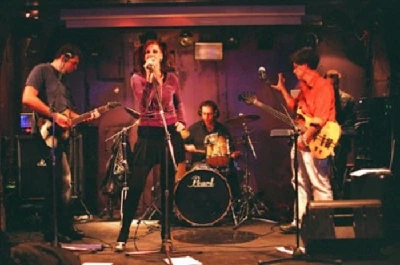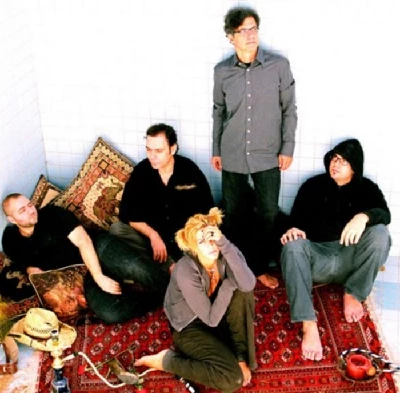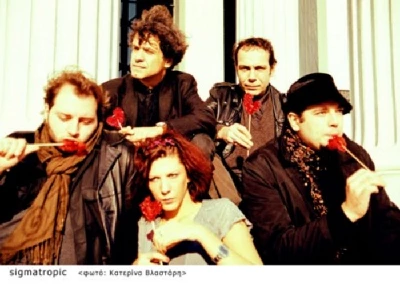published: 11 /
1 /
2008

Sigmatropic is the project of Athens-based electro folk artist Akis Boyatzis. John Clarkson chats to him about his two recent albums, which have finds him working with a wide catalogue of guest singers including Robert Wyatt, Carla Torgerson, Mark Eitzel Howe Gelb, Robert Fisher and Cat Power.
Article
Sigmatropic is the project of Athens-based electro folk artist and guitarist/keyboardist Akis Boyatzis.
Boyatzis played and sung in local bands Captain Nefos and Libido Blume and spent time living in America in the 80’s and early 90’s before eventually moving back to Athens and forming in 1997 Sigmatropic, which is appropriately named after a turbulent chemical reaction. Its debut album, ‘Raising Wind’, a Greek only release, came out on Hitch Hyke Records the next year.
Sigmatropic’s second album, ‘Sixteen Haiku and Other Stories’, merged Boyatzis’s swarthy dance rock rhythms and ambient electronica with the poems of Greek Nobel-prize winning poet laureate George Seferis. A Greek edition of the album, which again was released on Hitch Hyke,came out in 2002, and this was followed by an international edition in 2003, which, sung in English, was released on Tonguemaster Records. It featured on guest vocals a fantastic cast of seventeen cult musicians including Robert Wyatt, Mark Eitzel, Sonic Youth’s Lee Ranaldo, Cat Power, the Walkabouts’ Carla Torgerson, Steve Wynn, the Bad Seeds and Grinderman’s James Sclavunos, Pinkie MacLure and Simon Joyner.
‘Dark Outside’, Sigmatropic’s third album, was released last year on Tonguemaster Records. As well as both Boyatzis and Sigmatropic’s latest member, the siren-voiced Anna Karakalou, on vocals, the album, which is again sung entirely in English, has guest vocals from Gelb, Torgerson and Sclavunos and also the Willard Grant Conspiracy’s Robert Fisher.
Sigmatropic has gained a reputation for pushing its guests in directions in which they haven’t gone before. The often melancholic Fisher merges to stunning effect his gravelly vocals with sweeping dance beats on’ A Song in My Wallet’ and ‘The Blue Side of the Sun’, both his two songs on ‘Dark Outside’, while alternative rocker Gelb proves similar effective lending spoken-word vocals to sultry trip hop number ‘White’ .
Originally a bedroom project, Sigmatropic, which as well as Boyatzis and Karakalou currently includes Christos Krasidis (keyboards), Panos Scourtis (keyboards) and Yiannis Tryferoulis (drums), has been winning much acclaim in its native Greece for its energetic live shows.
Pennyblackmusic spoke to Boyatzis, in a brief gap in dates on a recent tour, about his band and its recordings.
PB : You did a Greek version of ‘Sixteen Haiku and Other Stories’ originally before then going on to do the international version. Was the Greek version sung in Greek ?
AB : Yes, it was. The Greek version was based on the original poems of George Seferis. I like poetry a lot and I was browsing through the Greek edition of his Greek poems and realised that they would make good lyrics. The whole of the Greek edition is based on George Seferis's original Greek words and is sung in Greek.
PB : Who did the vocals on this Greek edition ? Was it mainly you ?
AB : All the male vocals were done by me. It also featured two female voices.
PB : Who translated the poems for the English language version ? Was it you ?
AB : The translations were based on the official translation of Seferis's 'Collected Poems' by a scholar called Edmund Keeley. He was an American scholar and translated a lot of Greek poetry into English including George Seferis. I began with the translations that Edmund Keeley did, but I found that a lot of them did not have the same rhyming and the same rhythm as the originals in Greek, so I decided to use my own interpretation, which was nevertheless based on the original translations.
PB : Why did you decide that you wanted to do an international edition as well as a Greek edition ?
AB : It began an experiment. Our Greek label, Hitch Hyke Records, and our UK label, Tonguemaster, both involve the same guy, Theo Vlassopulos, and he came up with the idea. He said, "This music could stand up really well in an international market. Why don’t we give it a shot with voices in a native American or an English language and translate them as English poems and see what happens ?" Theo was actually the main organiser of the English version because he already knew a lot of the people who became involved. He was able to approach them personally and the majority of them agreed to do it
PB : How many of them were you aware of beforehand ?
AB : Of course I knew a lot of the older people like Robert Wyatt, Howe Gelb, Jim Sclavunos and Lee Ronaldo, but I didn’t know for example Simon Joyner and some of the more obscure artists on it.
PB : Did they choose which poems they were going to sing or did you decide for them ?
AB : They were given the Greek edition of the album and also an instrumental version of each song. Most of the people that we contacted were then left completely free to choose their own poems, but some chose more than one. Edith Frost gave us, if I remember correctly, ten or eleven.
PB : It must have been difficult for you to decide which ones you were going to use.
AB : Yes (Laughs). It was a very nice puzzle.
PB : How many of them came to Greece to do the recordings and how many of them mailed their contributions in ?
AB : The majority mailed their contributions in. It was just Carla Torgerson and Steve Wynn who did them in Greece as both of whom happened already to be recording there.
PB : As a result have you never met some of these people in person ?
AB : Yes, exactly. Some of these people like Jim Sclavunos and Pinkie MacLure I came to meet later. They came to Greece to play shows with us, but I didn't know them before.
PB : Did the music change at all between the Greek and the English edition ?
AB : Yes. The idea of the music remained essentially the same, but as some of the invited guests' vocal chords were very different to the vocals which we used on the Greek edition we had to modify the texture of the soundtrack accordingly. In a couple of cases we had to extend of the length of the songs. There were two songs that were shorter in the Greek edition. Some people also added their own music as well as vocals. It seemed funny to us (Laughs), but we finally decided that their music was so interesting that we would just leave it as it was.
PB : Who wrote the lyrics for 'Dark Outside' ? Was it you or did the other singers involved use their own lyrics ?
AB : The majority of the lyrics were written by me. I was also happy to have three contributions from Michael Willet, who is also Carla Torgerson's lyricist, and I bumped across this poem, 'Maggie and Millie and Molly and May', by EE Cummings. EE Cummings is amongst my favourite poets. It is not always very easy though to add music to some of his poems, but 'Maggie and Millie and Molly and May' fitted the music perfectly.
PB : You have written songs primarily in English in recent years. Why have you done that ? Do you find it easier singing in English than you do in Greek ?
AB : Yeah, I do actually. My musical influences are mainly British and American. My background extends from rock 'n roll and early Beatles stuff to the Velvet Underground and then to the punk and new wave, and then in the 90's into ambience. The majority of the music I remember listening to is British and American. I have difficulty with the Greek language in a way (Laughs).
PB : Some of the people who appear on 'Dark Outside' like Howe Gelb and Robert Fisher appear on very new territory on 'Dark Outside'. You seem to have taken them in directions they perhaps wouldn't have gone by themselves. Was it your intention to push them in new areas and genres ?
AB : On 'Sixteen Haiku and Other Stories' I wasn't exactly sure what some of the singers' approach would be and so on that album in some cases I felt that I should provide some directions. I felt somewhat uneasy about doing that and so on this one I decided to leave people completely free to do what they wanted. As Carla comes across to Greece pretty often and recorded her solo album, 'Saint Stranger', there(Sigmatropic collaborated on several of its tracks-Ed), there was some interaction between us on what she would do on her track. I don't really feel that I gave her directions though. What you hear on the album from the other three guests is what they came up with.
PB : Did they mail their contributions in or did they come to Greece ?
AB : They mailed them.
PB : 'Dark Outside' features Anna Karakalou on several tracks. Who is she ?
AB : Anna was born in Minnesota and until she was a teenager she lived in Chicago. Her father is Greek but her mother is American and her whole family moved to Greece when she was 14 or 15. She lived in the UK for a while as well and studied cinematography and filming there. She directed a play in Greece for which I contributed the music and eventually ended up singing two songs for it. Afterwards I thought she had the perfect voice for the entire Sigmatropic production, so that is how I met her and she became involved in Sigmatropic.
PB : Sigmatropic began as a bedroom project. When did it start playing live ?
AB : Originally Sigmatropic was more studio-orientated, but even with 'Random Walk' I decided that we needed a live band to promote the music. I used to consider myself much more a live musician than a studio musician. My previous bands were also live bands and in all its phases live playing has been a pretty essential component of Sigmatropic.
PB : Do the members of the live band also play on 'Dark Outside' or was it just you and Anna ?
AB : The way in which Sigmatropic makes music is that I put a basic arrangement down on a computer. After that I show all the band members it and they come up with their own ideas for the guitar playing and the keyboard playing and the drum playing and in Anna's case the vocals.
PB : The album has all sorts of colourful titles like 'White' and 'Red Across the Sand'. Why did you decide to call it 'Dark Outside' ?
AB : (Laughs) It is the same title as one of the songs on the album. I think that we are not living in the best era of the human race and in fact that we are living in the equivalent of another Dark Ages, and so I was inspired by the title of the song to use it as the name of the album. The notion is basically political.
PB : One of the things you have done on your website is tackle issues which concern you such as environmental problems and even the bad grammar of Dan Brown books. Do you think it is important that musicians should use their voice to encourage discussion and debate about political and other issues ?
AB : Yes, I do. It is not a new thing at all. It is basically what rock 'n roll music has done since the very beginning. It is what folk music used to do a lot in the 60's and 70's as well. I believe that artists should raise their voice to help world issues. They shouldn't just say, "I am a musician and music is something different" because music relates to every country in the world and it is something we can't live without it.
PB : You were planning an album of cover songs a few years ago. Is that still likely to happen ?
AB : A lot of people have asked me the same question. I keep coming back to the idea of a cover album, but time is so limited that rather than waste it on covers I feel we should be doing our own music. With the band, however, we have always put quite a few covers in our live shows, so the latest idea is for the whole band to go to the studio and to record a whole live session of covers and this could be the basis of the covers album.
PB : What other plans have you got for Sigmatropic for the future ?
AB : We are working on the next Sigmatropic album already. It is about 50 percent done and will be an album of maybe ten or twelve songs. It is pretty much in the same musical direction but I think will be more acoustically orientated. I am not sure if that will be the final theme of the album when it is finished. Things can change a lot during the production, but that is what I am thinking right now.
PB : Will you be collaborating with other people on this album ?
AB : Howe Gelb is a really good friend now. I really like working with him and so I will try to tempt him into becoming involved again. Robert Fisher was so keen on doing things properly for 'Dark Outside' that he wanted to come to Greece. His schedule was however pretty awkward and so he eventually had to mail his contributions in, but I appreciated his dedication to the project and so I hope to approach him again.
PB : It sounds like things are pretty busy for Sigmatropic then.
AB : Yeah, very busy. I am getting a lot of musical ideas at the moment and I am exchanging a lot of ideas with my band members, who are very good musicians. We are certainly keeping very busy (Laughs).
PB : Thank you.
Play in YouTube:-
Picture Gallery:-

